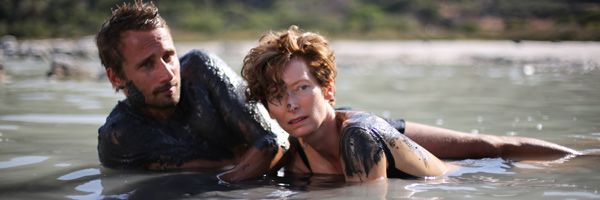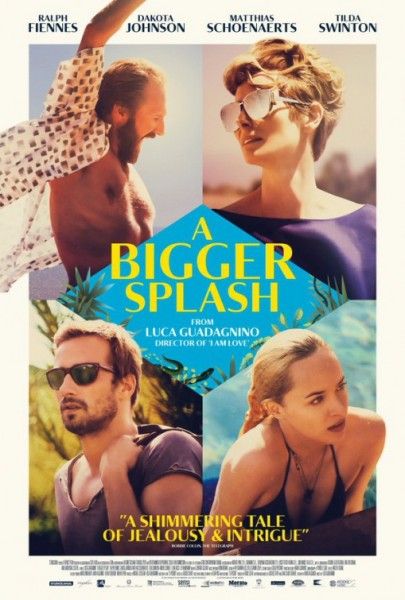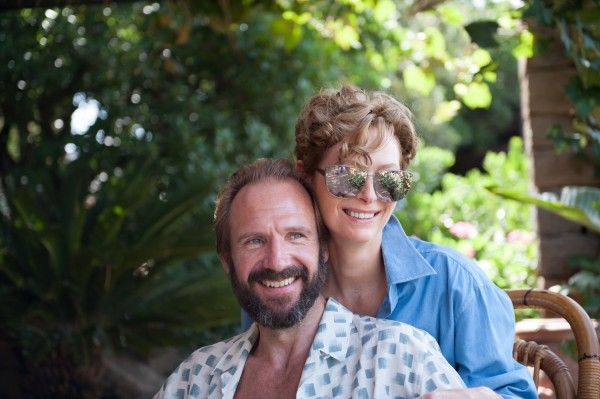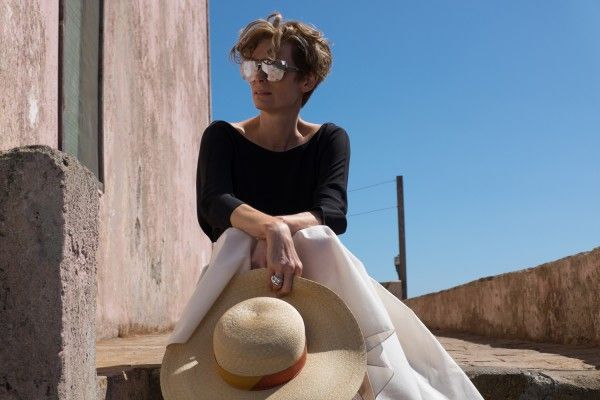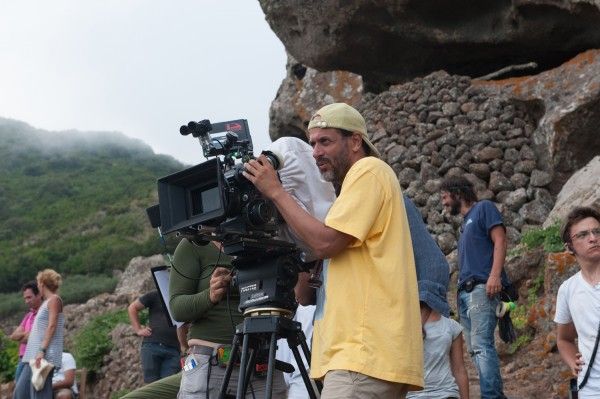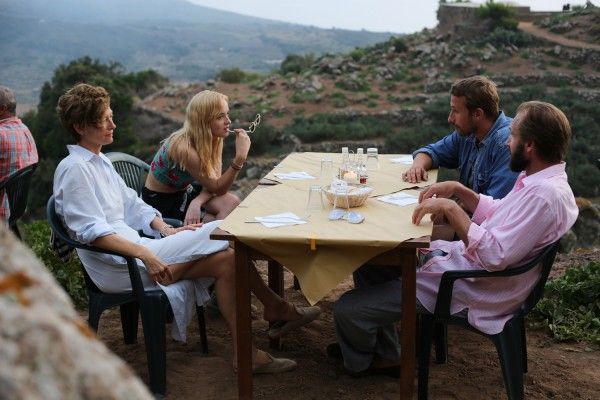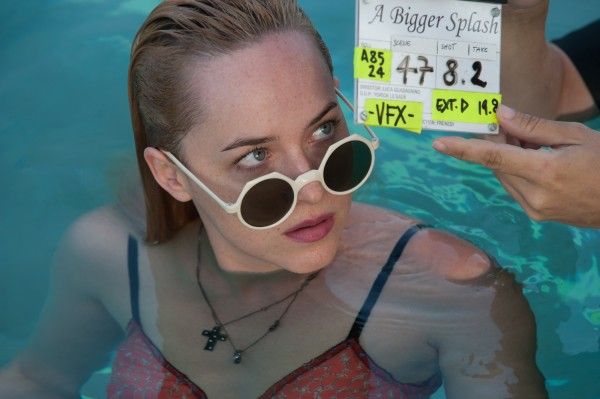For those familiar with screenwriter David Kajganich’s output, the voice behind horror films like The Invasion and Blood Creek and the man tapped to pen early scripts for Stephen King projects like Pet Sematary and It, it could come as a surprise that A Bigger Splash, an Italian-French erotic thriller starring Tilda Swinton and Ralph Fiennes, would be his latest project.
And yet, the screenwriter couldn’t be happier with the chance to make the film, a remake of the Jacques Deray ‘60s classic La Piscine. Only a rough translation of the original French source material, A Bigger Splash features Swinton doing her best Bowie as rock star Marianne Lane, unable to speak as tensions rise between her lover Paul (Matthias Schoenaerts), her ex-lover/record producer friend Harry Hawkes (Fiennes) and his enigmatic daughter Penelope (Dakota Johnson).
The film, which promises a darkly rotten climax early on and rides towards it, full-tilt for its entire running time, is a gorgeous look at desire and the repercussions of flippancy, hubris and self-absorption. Before the film hits theaters, I had a chance to sit down with the screenwriter to discuss his unconventionally hands-on experience, the process of recreating and improving upon an original film and (of course) got an update on It.
QUESTION: I’m a really big fan of Blood Creek, so I am so excited to talk to you today.
DAVID KAJGANICH: Oh my gosh, oh my gosh, that’s – I’m blushing, that’s, thanks for saying that.
Yeah, of course! I guess I’ll start at the beginning which is that I know this was sort of commissioned and pitched to Luca Guadagnino, so at what point in the project did you sort of join up?
KAJGANICH: Yeah, so Luca had been – they had tried to tempt Luca with this and he wasn’t so keen on it. And he was working on scripts, American scripts to look at potential directing gigs. And he read a script of mine called True Story and my adaptation of It, of all things, can you imagine Luca Guadagnino’s version of It? So he read those two, and he called me and said, “If you’re interested in this, maybe the two of us can figure out how to do it from a different vector.” So he sent me the film and I watched it and I didn’t get it. I didn’t understand why one would want to remake it. And that was sort of my first question to him and he said, “That’s what I wanted to hear. Now we can disassemble it and make something more interesting out of it.” And not to take anything out of the original, but it was just the original is sort of languid to the point of that being its identity.
It’s very chic.
KAJGANICH: It’s very chic. And I was so glad after having watched I Am Love to know that Luca, there’s something subversive in him and the way he directs and the way he tells a story. And I thought, “This will be interesting because the world will think it’s getting something ‘chic,’ but what they’re actually getting is far more complicated.” When Luca started talking about wanting to set it not in St. Tropez but in Pantelleria which is this very complicated place, it is simultaneously the little rocky island where Giorgio Armani has his summer house and where thousands of North African refugees, it’s the gateway to mainland Europe. There aren’t many places in the world where these two things are neighbors. And so to set the story there was so interesting because it meant these characters were on a kind of world stage that wasn’t intending to be a world stage. So that’s how we got involved. I was looking for a different kind of project after having done a lot of studio films that weren’t particularly rewarding to do and were often rewritten by other people and I hadn’t had a project yet where I felt really proud and felt like my work was actually helping the process instead of getting in the way of the process. And when Luca asked me to do it with him, it took me ten years of being a screenwriter in America to find out the experience I really wanted was in Italy.
And did the two of you ever watch the film together?
KAJGANICH: Well, when Luca and I sat down to watch it together and we couldn’t make the sound work on the television. [laughs] So we watched it without sound and that actually ended up being extremely helpful. Because we were able to talk about the shapes of the characters and the way the thing is structured without the benefit of having to be stuck inside the ideas of that film. Of which there are kind of few, it’s a style film in a lot of ways. So we had fun kind of being able to project, “I know that’s not what this scene is really about, but let’s make it about this.” We really tried to subvert as many expectations about what people would think a remake of the film would be.
Music plays a huge role in this film, particularly the Rolling Stones. Were you a big Stones fan when you were writing this?
KAJGANICH: I’m telling you, I was a Beatles guy before writing this movie. And then Luca said, “Listen to the Stones as much as you can, I want that attitude in the film.” So I started with Aftermath, which was their first album, and over the course of the next year, probably 80% of my life was the Rolling Stones. And now, the Beatles, they can go to hell. The Rolling Stones are the rock band of our planet. It’s amazing what they’ve accomplished over the course of their career. And there are moments where, for instance, where Ralph’s character tells the story about producing a particular song, and subbing the drums for a trashcan, I had read a version of that anecdote in an unauthorized biography of the Rolling Stones. And then we got a call, Mick Jagger wanted to know, how did we know that story. So I had this email, through our music supervisor with Mick Jagger about getting – their attitude about that story was basically, “Okay, great, if you’re going to tell that story then you should get it right.” So they emailed me two or three little tweaks to the story. And if that’s the type of vote of confidence we’re going to get from the Rolling Stones, I’m happy. It was great.
Obviously Tilda is a rocker in this movie and Ralph has got his record producing background, but Penelope, she has also has a sort of rocker vibe to her, she’s very apathetic. What were you trying to build in there?
KAJGANICH: To me, what’s interesting about Penelope is she’s learning this language from Harry, this kind of provoking, pitiless language she has with the world. And is trying that on for size because she sees how it benefits him. What I love about the way that Dakota played that character is that she really understood that whole role as a performance and we only get one moment where we see her face and it’s not performing for anyone anymore. What was written into the part was the intentionality of that character as always wanting to fuck with someone. And always trying to tweak the story to amuse herself. And it’s such a dangerous way to play with the world and I think she played it really well.
There is this fantastic element to her too, where in the original film she is sort of this unrealized, simple ingenue. But she’s written in this as a woman who is very clearly trying to be that ingenue, the uncomplicated, not self-aware ingenue of the first film.
KAJGANICH: It was all of these things were a collaboration with the actors, we did a lot of one on one rehearsal and group rehearsal. It was exciting to write a character who is really performing the whole time. You can sort of guess what she’s after, but she’s very smart and gone a lot without guidance. She absorbs different kinds of influences in a way that’s very unfiltered. She’s like a sponge, a postmodern sponge. And I think her new interest is this guy Harry who has this very weird way of provoking in the world.
One of the big ideas of the film is a failure to communicate, there are these issues with Marianne’s voice and they’re in a foreign country. So what was it like writing a script full of characters who can’t really communicate with each other and especially for a character who can’t speak?
KAJGANICH: When you’re writing, you’re always looking for a way to maximize the dramatic potential of a scene without text. If you can find ways for people to explore what they want or try to get what they want without just talking about it, it was really helpful. And this was a suggestion of Tilda’s quite late in the process, for having her to have an issue with her voice. Originally in the script, she was an actress who was trying to learn an American accent for a part, so there was already something about her voice that was conspicuous in the early drafts. And she very smartly said, “What if I take this and just remove my voice entirely?” And we went through a period of negotiations where we thought, “Well, let’s not make it an entirely silent performance,” but let’s have her choose very carefully what she says out loud knowing that it’s at risk to her future as a singer. And that just meant, the difficult thing was to balance the quartet so it still felt like all of these four characters sort of had an equal weight in the proceedings. And when you have one character not speak at all, there’s a danger of having everything shift to that silent corner. But they’re such good performers, terrific director and we had enough time to modulate it. But it made everything that much more interesting. The more ambiguity in this kind of filmmaking, the better. And having someone not be able to speak but actually be able to whisper if she chooses to made it even more interesting. If she were just mute, it would be just a limitation, but this was a set of choices the character was making. I think the first line the character says in the film was about ordering a margarita, which seems like such a non-essential thing to say, but if you’re Paul, her husband, you’re thinking, “Well she did say it, she must be wanting to engage with Harry on some level even if that’s just ordering a margarita.” His first panic alarms is that she’s actually talking to him about nothing, which is something.
With Harry being a Stones producer, I’d imagine Don Was might have been an inspiration. Did you get a chance to meet Don Was? Or talk to him?
KAJGANICH: No, the closest we got is, Ralph’s brother is actually a record producer, and so we had long conversations about how to get this dialogue right so we really felt like this man was really inside the real record producing world. But as soon as we knew the Stones had their eye on the project, I spent weeks just sort of praying that they would think we were doing a good job of being stewards of their own kind of cultural history and in the end they really were of enormous help to us, and support.
I don’t want to spoil what the moment is, but there’s a moment, a visual moment in the film that recalls Brian Wilson specifically. How much was that an intentional touch and at what point did that become part of what you knew was going to be in the film?
KAJGANICH: That’s a great question. It wasn’t planned to pick up on the Brian Wilson image so much as when I was writing a flashback, I sort of knew it would come up. Harry has this line where he mentions it was the end of the Rolling Stones and sort of liberated them in what came next. And the pool in the film operates in this was in the movie where it’s a free space for desire, things that happen in the pool wouldn’t happen even two feet out of the pool. And we wanted to keep using it in that way.
You said you were on set, in terms of behind the scenes, how much did the actors consult with you and how did you get to field anything they had questions about?
KAJGANICH: We had a fairly long rehearsal process on the island. Luca was very smart to do get everyone there and then do the rehearsal. The island is such a big part of the energy of this film. And different actors had different relationships to the process. I mean, Ralph for example, is a brilliant theater actor, as well as a film actor so he came and had the entire script in his head, I mean he could have performed the entire thing by himself doing all of the parts, that’s how well he had it in his head. So he didn’t particularly want to change anything, unless, sometimes he’d call me or Luca over and say, “Do you mind if I switch the verb and the noun in this line because it will flow better.” But that was very occasional and always very respectfully asked, and my thought is you can actually do whatever you like with the line, it’s less about the words and more about intention. He was incredibly generous in that way. And we did a lot of work on Marianne’s character to sort of tailor it to things that were going on in Marianne’s psyche and make that really feel like her own terrain. Which included taking her voice away and things like that. So it’s very different for each of these actors because they are such good actors and they have found processes that really help them get inside of these parts. And it was really a pleasure to tailor each one to their strengths and the way they wanted to work. And Luca, as a director, he couldn’t be more open to that kind of process, it was like a game of triple chess, playing boards on top of boards with these four actors.
It’s sort of an isolated movie, we’re very much on this island and on this villa, but there are moments of retreat, whether that’s a brief encounter with some of the African immigrants who have come as refugees or with these locals who are just making ricotta in their kitchen. How much were those in the script and how much were spontaneous?
KAJGANICH: The former was, the latter wasn’t. And Luca, as a director sort of want actuality before all things. So when we decided that was going to be the island, we kept our eyes open for opportunities to put the island in the script. That ricotta scene was actually intended at first to be a scene with a Giorgio Armani party that Marianne was taken to to humiliate her. And then Luca bought cheese one day and said, “Actually, I think Harry would do this instead.” So I very quickly ran over there and cased it out, and those were the actual, Rosa and Giuseppe are the actual cheesemakers of that part of the island. So we sort of had the film and went and basically put Tilda and Ralph in that room and told them to behave normally and caught that piece of the island for the film instead of trying to bend the island with what we came to the island with.
So after you’d written it and worked with Luca, what surprised you most when you saw the final cut of the movie?
DAVID KAJGANICH: Well, I’m lucky to have had a much better experience than the one that that question assumes which is that I was on set every day and in the editing room. There were no surprises. Luca is a great collaborator. He’s a great collaborator in that he actually loves collaborating. So when I saw the final cut it was less like, “Oh, they took my line and cut it,” it was more just I knew how many scenes didn’t make it in. Which was a surprise to me, to know how many things we built into the shoot that didn’t make the final cut, that I have found since will be on the DVD.
That’s so great. So, I can’t let you go without asking about It. Are you still on it?
KAJGANICH: I don’t know! I don’t know if I am.
No one seems to!
KAJGANICH: We know there’s a new director, I don’t know myself whether he’s going back to any of the previous drafts or writing from scratch. I may not know until the film comes out. I don’t know how it works! If you find out let me know.
[laughs] I absolutely will. Thanks so much!
KAJGANICH: Thanks, this was great.

